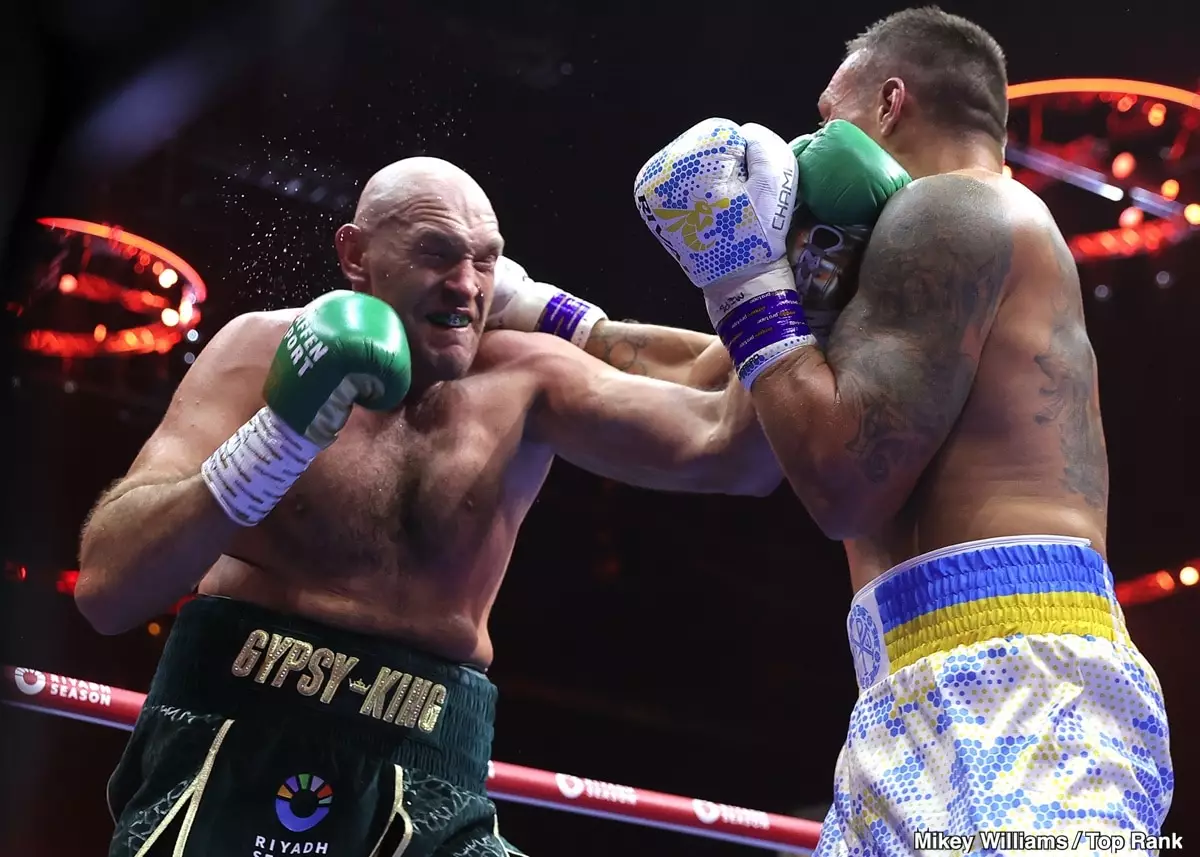BY BOXING HIT STAFF-
In December, the boxing world eagerly anticipates the rematch between Tyson Fury and Oleksandr Usyk, set to take place in Riyadh, Saudi Arabia. The backdrop of this highly charged bout is rife with drama and expectations, fueled by Fury’s unyielding belief in his path to victory: he asserts that a knockout is the only way to secure a win against the unified heavyweight champion. This article delves beneath the surface of this climactic showdown, analyzing Fury’s past performance, his mental fortitude, and the challenges that lie ahead.
Reflections on the Past: Fury’s Loss to Usyk
Back in May, Fury’s performance against Usyk raised eyebrows within the boxing community. Many observers noted a stark contrast between the fighter who faced Deontay Wilder in 2020 and the one who squared off against Usyk. Fury appeared to have lost some of his agility and speed, qualities that marked his earlier bouts and made him a formidable opponent. Critics pointed out that he seemed out of shape, his physique more reminiscent of a man out of his prime rather than a world-class athlete. The perception was that his once-mighty stamina had been compromised, affecting not only his ability to land powerful punches but also his overall ring presence.
In the aftermath of the match, it’s clear that Fury is grappling with an internal conflict concerning his defeat. He believes he was shortchanged, arguing that he should have emerged victorious. This lingering sense of injustice, however, may be a double-edged sword. On one hand, it can provide him with the drive to keep pushing forward; on the other, it may hinder his acceptance of the necessary adjustments he must make to improve his performance. The reality is that Fury must reconcile his emotions with the lessons he needs to learn.
A critical aspect of competition is the ability to learn from past mistakes. For Fury, acknowledging the realities of the previous match with Usyk may be key to his success. However, instead of introspection, he tends to cling to the notion that he was unjustly defeated. This perspective might temporarily bolster his confidence, yet it could simultaneously blind him to the glaring gaps in his strategy and skill set that Usyk exploited in their first encounter.
The psychology of an athlete is complex, particularly when they have enjoyed a history of victories. With Fury at 36 years old, one might question whether he possesses the mental resilience needed to navigate his current challenges. An athlete’s mindset is often as critical as their physical conditioning, and if Fury’s disbelief in Usyk’s dominance lingers, he may find himself repeating mistakes rather than overcoming them.
Ironically, the structure of boxing’s landscape creates a scenario wherein Fury might feel less pressure to win. Reports suggest that his potential fight with Anthony Joshua remains on the table, win or lose against Usyk. Such a cushion could dilute the fire that typically drives athletes to push their limits. If expectations remain high regardless of the rematch’s outcome, Fury might not feel compelled to make the necessary sacrifices or adjustments to truly prepare for the rigors of the bout.
This paradox is troubling; it raises the question: what happens when a fighter faces no real consequence for poor performance? The incentive should stem from the desire to reclaim glory and prove oneself, yet if Tyson is already eyeing his next paycheck with Joshua regardless of the Usyk outcome, it could lead to complacency.
As the date approaches, Fury insists that knocking out Usyk is paramount to reclaiming his title and restoring his reputation. However, he must recognize that Usyk is not the same character as Wilder, whose lack of finesse opened doors for Fury’s tactics. Usyk is more agile, intelligent and adept at avoiding strikes. It is vital for Fury to adapt his fighting style, moving beyond brute force strategies that worked against less skilled opponents.
Fury’s insistence on a knockout is commendable, yet it must be accompanied by a comprehensive tactical approach. Training must involve refining his speed and minimizing the flabby physique that may hinder him in the ring. Usyk has proven himself as not just a champion but as a clever tactician; Fury must adjust his stance accordingly.
As December nears, Tyson Fury has a pivotal opportunity to redefine his narrative. Rather than wallowing in self-doubt and the allure of a cushy fallback plan, he must step into the ring with a renewed sense of purpose and resilience. The outcome of the rematch with Usyk may well define his legacy within the sport of boxing.


Leave a Reply